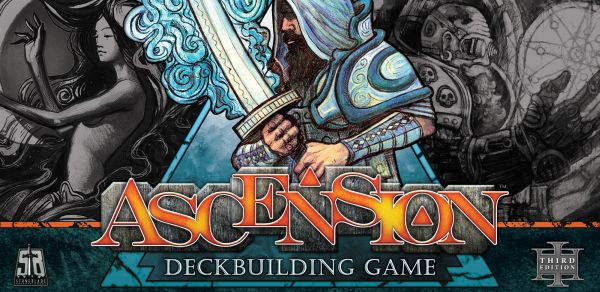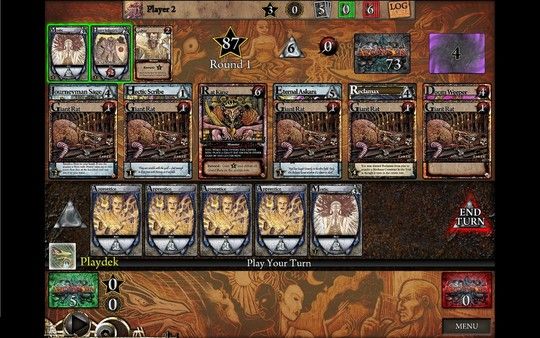
Let me just get this out of the way: Ascension is my favorite deckbuilding game of all time. There are lots of fun deckbuilders out there, but nothing compares to Ascension. I’ve played the original tabletop version and I’ve also played it on my iPad. And now that it’s available on the PC, I’ve played that version as well. Sadly, I have to say that the PC version, titled Ascension: Deckbuilding Game, is my least favorite way to play the game. However, despite the performance issues I had with the game, playing it on your PC might be the easiest way to gain access to the world of Ascension. Short of spending tons of money on the tabletop version or playing it on your mobile device, that is.
Platforms: PC
Publisher: Playdek
Developer: Playdek
Genre: Tabletop Deckbuilding Game Gone Digital
Release Date: December 16, 2014
ESRB Rating: Not Rated
 “Back up for a second, Nicole,” some of you might be saying. “What’s a deckbuilder?” A deckbuilder is a game in which you start with a core deck of cards which then allow you to acquire more cards to add to your deck. The cards you acquire are lined up in the center, and are available for all players. In Ascension, your starting cards are Apprentices and Militia – the former allow you to purchase cards, and the latter allow you to kill enemies. Every turn, you draw five cards, and use your hand to acquire, kill, and generally manipulate the center cards.
“Back up for a second, Nicole,” some of you might be saying. “What’s a deckbuilder?” A deckbuilder is a game in which you start with a core deck of cards which then allow you to acquire more cards to add to your deck. The cards you acquire are lined up in the center, and are available for all players. In Ascension, your starting cards are Apprentices and Militia – the former allow you to purchase cards, and the latter allow you to kill enemies. Every turn, you draw five cards, and use your hand to acquire, kill, and generally manipulate the center cards.
I started playing Ascension: Chronicle of the Godslayer as a tabletop game, and quickly grew addicted to it. From there, I bought the initial iOS release, and have continuously upgraded the mobile edition as each expansion has become available. And now that it’s on PC, I wanted to try it out to see what the differences were. Unfortunately, I have to report that the differences are mostly negative ones.
Both the mobile and PC versions have real-time and asynchronous online play, meaning you can sit together and play it with other people, or you can play it online and wait for the other players to take their turns. Both versions support one-to-four players, and you can replace the players with AI, meaning you don’t even need other people to play the game. I don’t like waiting for real-life players to take their turns, so I am almost always playing the game against AI, unless I can find someone to play it with locally.
The best part about the PC version is that it includes five expansion decks right off the bat. For $9.99 on Steam, you get the base game (Chronicle of the Godslayer), as well as Return of the Fallen, Storm of Souls, Immortal Heroes, Rise of Vigil, and Darkness Unleashed. Each one adds more heroes and monsters to the game, but some of them change the game in more considerable ways. Storm of Souls adds in Event Cards, which make extra actions available to the player. It also introduces Trophy Monsters, which can be held onto and used at any point in the game. Immortal Heroes adds Soul Gems, which add in extra bonuses. Rise of Vigil changes things up a lot with Crystal Shards, which can be used for additional bonuses based on the card. This deck also adds Treasure Cards. Finally, in Darkness Unleashed, there are Dark Energy Shards, as well as the Transform ability, which allows some cards to evolve. This is a great deal for the price!

Excited as I was to play the game, when I finally sat down, I was disappointed. In the mobile version, it’s easy to draw your cards, and then you can use them with an easy swipe of the finger. In the PC version, mousing over the cards enlarges them, which, while necessary for cards when you’re trying to read them, is terribly annoying when you’re just trying to play them. Other times, when I’m trying to read a card, no matter how I mouse over it or click on it, it simply will not enlarge. In fact, left clicking a card in the center row makes you automatically acquire or kill it, meaning that in those first few games, I was picking up a lot of cards I didn’t want in my deck.
The first night I played the game, it froze half a dozen times. Normally I can finish a digital game of Ascension fairly quickly, and then go right into my next game. That night, I only finished maybe two games, and the rest simply ended when the game froze and crashed. It was frustrating, and I ended up playing Ascension on my iPad just to satiate my thirst for playing the game.
As much as I want to recommend Ascension: Deckbuilding Game to everyone, I have to say that until Playdek irons out the issues in the PC version, it’s one that you should pass on. If you have no other way of digitally playing Ascension, and don’t want to drop hundreds of dollars on the tabletop game, then you should pick this up in the hopes that they’ll eventually improve it. It’s a shame that this buggy PC version is the only way for some gamers to have access to Ascension, though if you’re willing to tolerate some issues and can work around them, then definitely pick this up.
But if you really want to get into Ascension, I can’t recommend the quick and efficient iOS version enough.

Review Disclosure: A review copy of Ascension: Deckbuilding Game was provided by Playdek for the purposes of this review.







